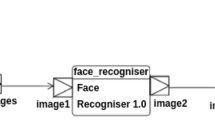Abstract
As the real-time computing industry moves away from static cyclic executive-based scheduling towards more flexible process-based scheduling, so it is important for current scheduling analysis techniques to advance and to address more realistic application areas. This paper extends the current analysis associated with static priority pre-emptive based scheduling; in particular it derives analysis for tasks with arbitrary deadlines that may suffer release jitter due to being dispatched by a tick driven scheduler. We also consider bursty sporadic activities, where tasks arrive sporadically but then execute periodically for some bounded time. The paper illustrates how a window-based analysis technique can be used to find the worst-case response time of a task set, and shows that the technique can be easily extended to cope with realistic and complex task characteristics.
Similar content being viewed by others
References
Audsley, N. C. 1991. Optimal priority assignment and feasibility of static priority tasks with arbitrary start times. Dept. Computer Science Report YCS 164, University of York.
Audsley, N., Burns, A., Richardson, M., Tindell, K., and Wellings, A. 1992. Applying new scheduling theory to static priority pre-emptive scheduling. Report RTRG/92/120, Department of Computer Science, University of York.
Baker, T. P. 1991. Stack-Based Scheduling of Realtime Processes.Real Time Systems, 3(1).
Garey, M. R., and Johnson, D. S. 1979.Computers and Intractibility, Freeman, New York.
Hutcheon, A. D. 1992. Timings of run-time operations in modified York Ada. Task 8, Volume C, Deliverable on ESTEC Contract 9198/90/NL/SF, York Software Engineering Limited, University of York.
Joseph, M., and Pandya, P. 1986. Finding response times in a real-time system.BCS Computer Journal, 29(5):390–395.
Lehoczky, J. P. 1990. Fixed priority scheduling of periodic task sets with arbitrary deadlines.Proceedings 11th IEEE Real-Time Systems Symposium, 5–7 December 1990, pp. 201–209.
Lehoczky, J., Sha, L., and Ding, Y. 1989. The rate monotonic scheduling algorithm: Exact characterisation and average case behaviour.Proceedings of the Real-Time Systems Symposium, pp. 166–171.
Leung, J. Y. T., and Whitehead, J. 1982. On the complexity of fixed-priority scheduling of periodic real-time tasks.Performance Evaluation, 2(4):237–250.
Liu, C. L., and Layland, J. W. 1973. Scheduling algorithms for multiprogramming in a hard-real-time environment.Journal of the ACM, 20(1):46–61.
Locke, C. D. 1992. Software architecture for hard real-time applications: Cyclic executives vs. fixed priority executives.Real-Time Systems, 4(1):37–53. (Netherlands).
Locke, C. D., Vogel, D. R., and Mesler, T. J. 1991. Building a predictable avionics platform in Ada: A case study.Proceedings of the 12th Real Time Systems Symposium, pp. 181–189.
Rajkumar, R., Sha, L, and Lehoczky, J. P. 1988. Real-time synchronization protocols for multiprocessors.Proceedings of the IEEE Real-Time Systems Symposium, pp. 259–269.
Sha, L., Rajkumar, R., and Lehoczky, J. P. (1990). Priority inheritance protocols: An approach to real-time synchronisation.IEEE Transactions on Computers, 39(9):1175–1185.
Tindell, K. 1992. Using offset information to analyse static priority pre-emptively scheduled task sets. Dept. of Computer Science Report YCS 182, University of York.
Tindell, K. 1993. Holistic schedulability analysis for distributed hard real-time systems. Department of Computer Science report YCS197, University of York.
Tindell, K., Burns, A., and Wellings, A. J. 1992a. Allocating real-time tasks (An NP-hard problem made easy).Real-Time Systems, 4(2):145–165.
Tindell, K. W., Burns, A., and Wellings, A. J. 1992b. Mode changes in priority pre-emptively scheduled systems.Proceedings 13th IEEE Real-Time Systems Symposium, 2–4 December, pp. 100–109.
Author information
Authors and Affiliations
Rights and permissions
About this article
Cite this article
Tindell, K.W., Burns, A. & Wellings, A.J. An extendible approach for analyzing fixed priority hard real-time tasks. Real-Time Syst 6, 133–151 (1994). https://doi.org/10.1007/BF01088593
Issue Date:
DOI: https://doi.org/10.1007/BF01088593




